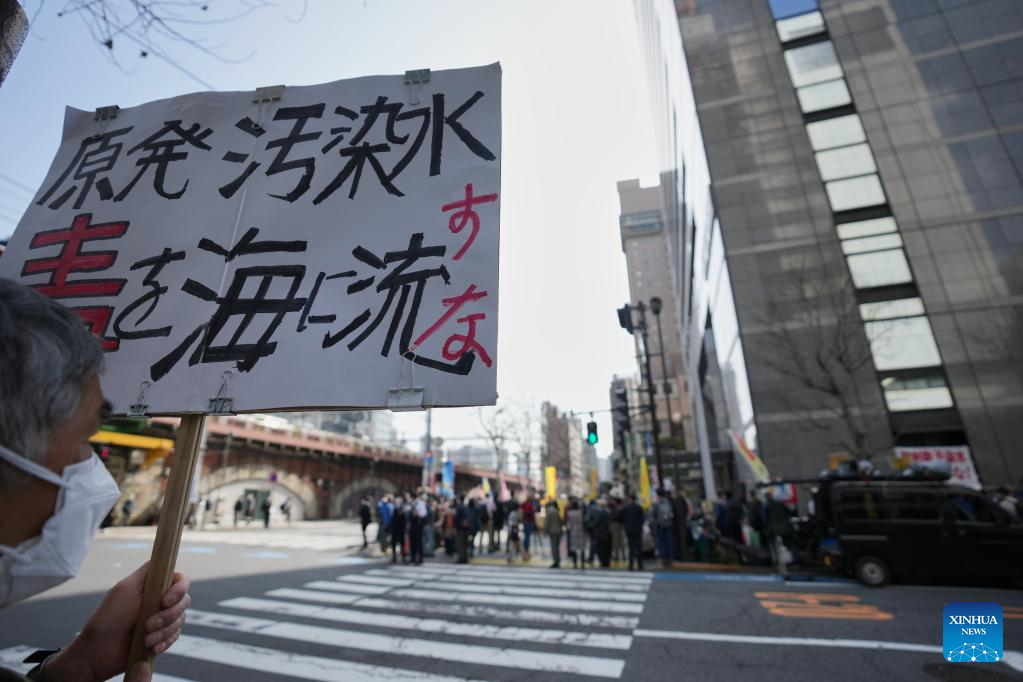
A sign that reads "do not dump contaminated wastewater into the sea" is pictured during a protest near the headquarters of Tokyo Electric Power Company (TEPCO) in Tokyo, Japan, March 11, 2023. (Xinhua/Zhang Xiaoyu)
TOKYO, March 11 (Xinhua) -- As Japan moves to push ahead with dumping nuclear-contaminated wastewater from the wrecked Fukushima Daiichi nuclear power plant into the Pacific Ocean, local residents are expressing their anger and opposition.
Saturday marks the 12th year after a 9.0-magnitude earthquake hit northeast Japan, which is also known in the country as the Great East Japan Earthquake. On March 11, 2011, an ensuing tsunami also led to core meltdowns at the Fukushima power plant operated by Tokyo Electric Power Company (TEPCO), resulting in a level-7 nuclear accident, the highest on the International Nuclear and Radiological Event Scale.
"The ocean is not a dustbin!" "Do not discharge radioactive-contaminated water into the sea!"
In front of the TEPCO headquarters in Tokyo, a large number of people gathered early Saturday to express their strong opposition to the discharge plan by holding various banners and signs, or handing out leaflets.
"I am strongly opposed to the discharge. The contaminated water, if stored for 100 years, will be much less radioactive according to its half-life, and there is room for these tanks in Fukushima," said Makoto Yanagida with Japanese environmental organization Tanpoposya, holding a placard.
"There are too many radioactive elements in the water, not just tritium. Also there is no way that TEPCO's plant can totally get rid of the tritium," he said.
A guitarist named Jonny H., who was playing an anti-discharge song at the gathering, told Xinhua that "discharging nuclear wastewater into the sea is a crime!"
"If the water is discharged, we will definitely not eat fish from Fukushima," said the musician, adding that Fukushima's aquaculture industry heavily struck 12 years ago is now recovering and the discharge would only be repeating history.
Due to the nuclear disaster, fishery in Fukushima, after decade-long testing operations, had not resumed to full scale until March 2021. In April 2021, then Prime Minister Yoshihide Suga announced the government's decision to release treated nuclear-contaminated wastewater from the damaged power plant into the sea.
In front of two TEPCO officials in total silence, a Sanya Labor Center member surnamed Mukai was reading aloud a petition. "The radioactive elements in the nuclear waste water will return to the human body through the food chain including algae and fish, and will again damage people's health."
"Your company's claim that there is no place to store the wastewater is groundless! It is hypocritical and irresponsible! It is a violation of the Convention on the Prevention of Marine Pollution by Dumping of Wastes and Other Matter 1972," said the man.
At least 378 children in Fukushima have been diagnosed with thyroid cancer since the accident, said Toshiko Okada, a member of a citizens' group. "Our clean ocean and beautiful home should be given back to us," she said.
On the same day, people gathered in front of the Prime Minister's Official Residence to protest against the irresponsible dumping plan.
"The Fukushima nuclear accident must not be forgotten!" "Resolutely oppose the discharge of nuclear-contaminated water!" "Protect the sea!" "Protect the children!" The protesters' forceful chants resounded amid a gust of drums.
On Friday afternoon, Japanese people also gathered in front of the Ministry of Economy, Trade and Industry to protest the discharge plan.
"The nuclear accident is still going on and the emergency declaration has not been lifted. Nuclear-contaminated water cannot be released into the sea and radioactive materials must be intensively managed," Mizuho Fukushima, head of Japan's Social Democratic Party, said at the gathering.
The Japanese government said in January that starting in this spring or summer, over 1 million tons of radioactive wastewater from the wrecked Fukushima nuclear power plant in northeast Japan will be released into the Pacific. ■



